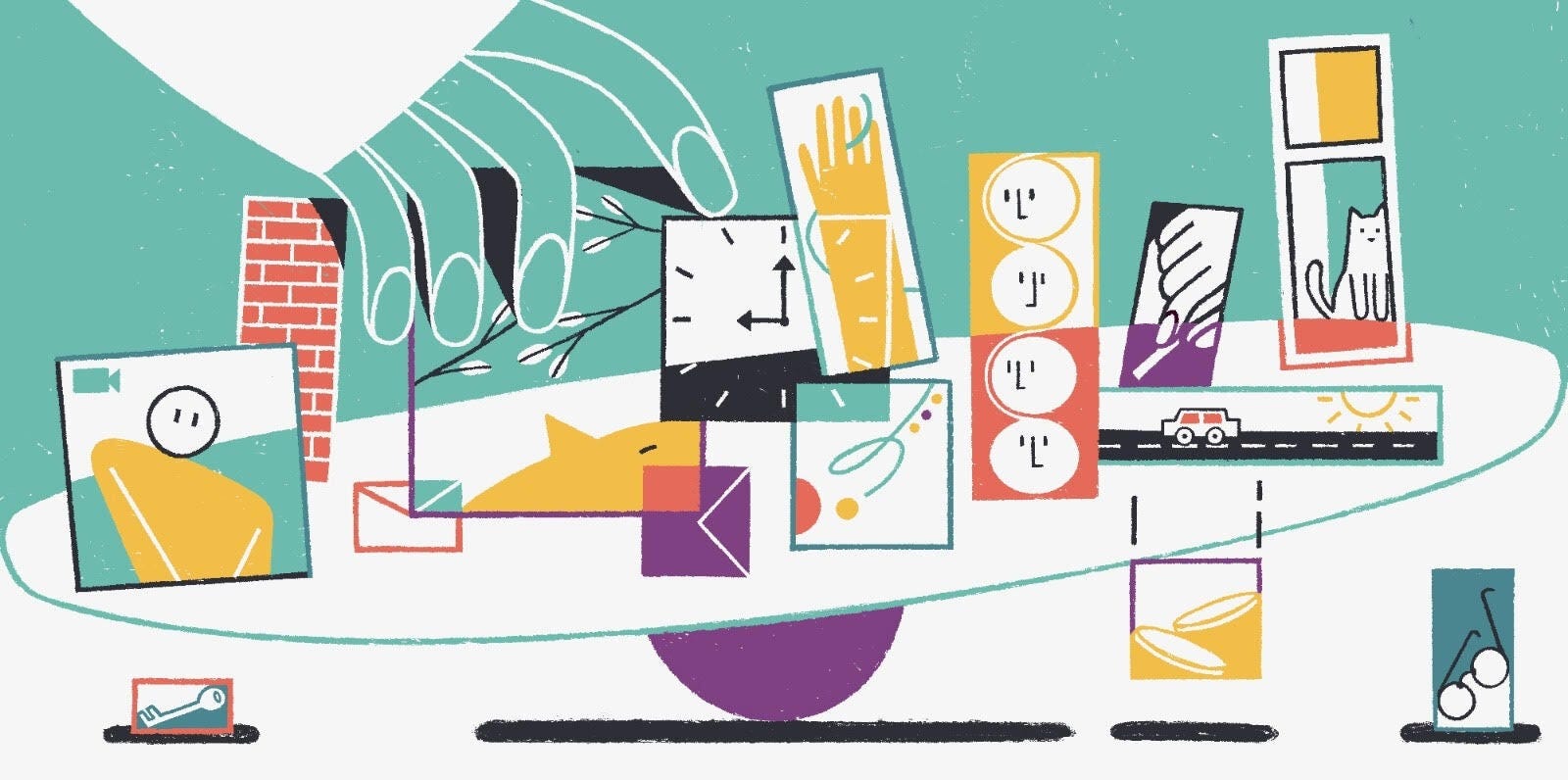11 key takeaways on the psychological impacts of the coronavirus
Published in ATÖLYE Insights · 24 min read · February 5, 2021
Coping with the effects of the pandemic as a community
Co-authors: Dr. Çiğdem Yumbul, Melissa Clissold Editors: Atılım Şahin, Ömer Ataş, Özgür Arslan In-text illustrations: Aleyna Tezer Translation: Cüneyt Bender
Content
Introduction Stress Trauma Psychological Resilience Solidarity Are we all in the same boat? 11 Key Takeaways Free psychological support Resources

Introduction
Stones in the road? I save every single one, and one day I'll build a castle. - Fernando Pessoa
2020 hit us all very hard. There's no denying that the global pandemic has psychologically pushed us in ways that we could have never imagined. Since its founding, ATÖLYE's principles have been based on engaging, nurturing, and mobilizing our community. It is for this reason that we have also tried to truly nurture our collective well-being during this time. Of course, this has not been easy as each of us has tried to adapt to "new ways of being." Jumping from one Zoom call to another, creating new workspaces from home... Being unable to socialize, see our families, go outside, and for some of us, sadly, experiencing the death of loved ones, has made this period incredibly strenuous.
Whilst we have tried to remain positive during this time, it is completely normal to have experienced (and continue to experience) ups and downs. We will likely not realize the impacts of COVID-19 until years to come; not only the social and economic impacts but perhaps, more importantly, the psychological impacts too. It is no surprise that "mental health" was one of the top trends on Twitter last year. 2021 will be no different.
To try and understand what we have been going through individually, collectively, and as a Community, we decided that it would be best to have a psychologist come and talk to us about what is truly going on within our bodies and our minds. To be able to understand our state of being, and the state of being of others would at least allow us to try and tackle our slumps and lows during this time. Within this scope, we invited our Community member Dr. Çiğdem Yumbul for a Community-wide session to discuss and answer questions about our psychological state during this pandemic. We wanted to share her knowledge, findings, and approach with you all as we enter this new year to help the worldwide community reflect upon what it is that we have truly gone through, are going through, and what we can do as individuals - as well as local and global communities - to get through this all together.
The COVID-19 pandemic is a global disaster that our generation has never faced before.
Since the first day of its emergence, COVID-19 has pushed almost every system established by people to its breaking point, and this global disaster harshly reminds us how dysfunctional these systems are. During this time, we have had time to truly reflect upon what matters to us. Unable to carry out our everyday rituals, meet up with our friends and family, go on outings to concerts, art galleries, and theatres - all on top of working from home or in risky conditions, has pushed each one of us to question our connections to our inner and outer worlds.
We have had to hold on to, create, and re-define our sense of "community" as we continue to "be together" in a highly digital world. The coronavirus has not just affected our individual lives but has impacted us as a whole. The grief that surrounds the friends and families of over 2.27M million (February 4, 2021) people who have passed away from this deadly disease, the anxiety we feel from being potential "spreaders," the struggle of being quarantined at home; all of this can be felt across the globe every day.
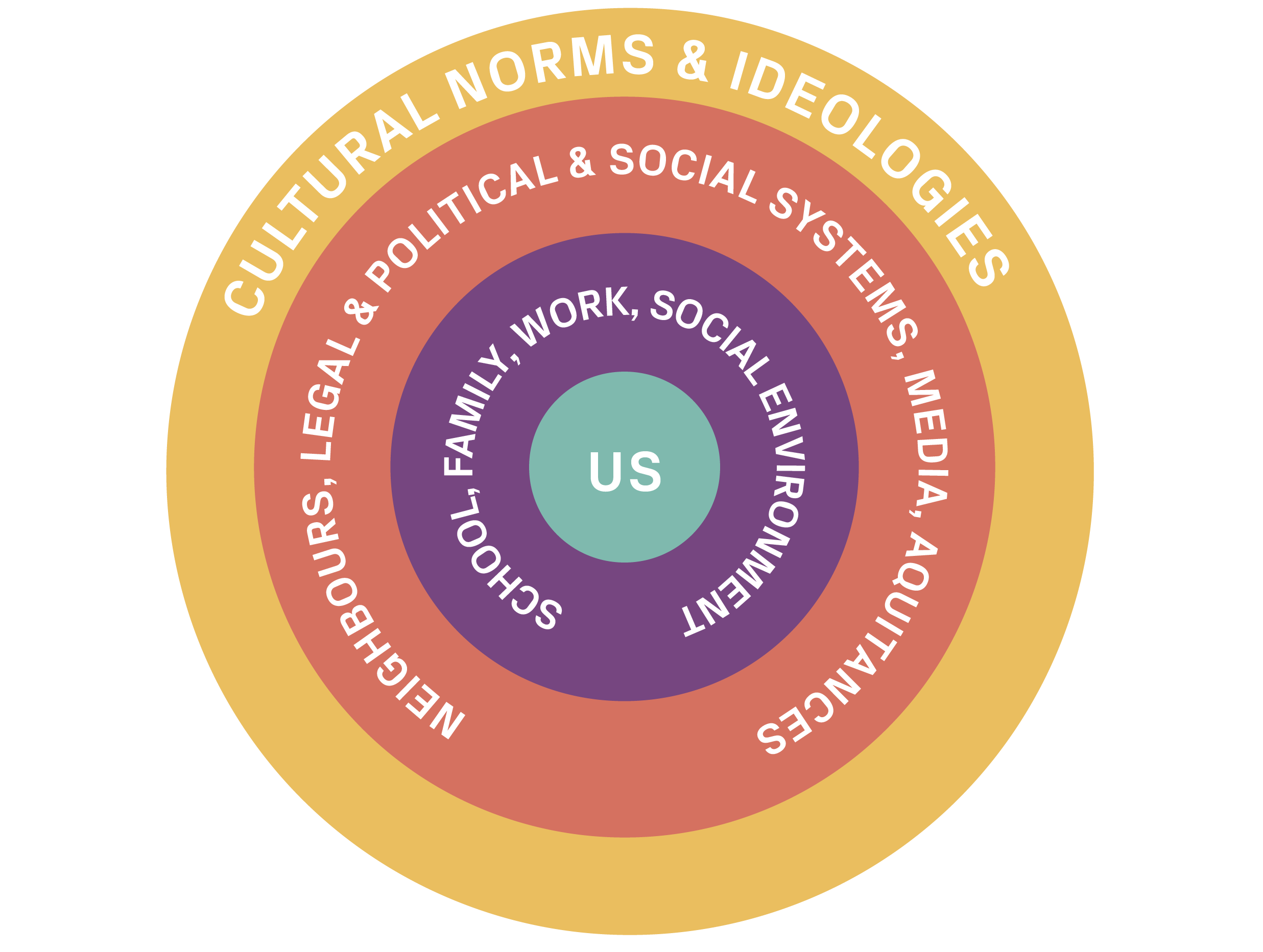
It is true that, as individuals, we all exist in an ecosystem of interconnected systems (Bronfenbrenner, 1979). The inner-circle includes individuals surrounded by an outer circle consisting of family, school, social peers, business, people, and organizations that we interact with. The next system, which encompasses the previous two circles, is comprised of neighbors and acquaintances, legal, political, and social systems, and finally, the media. The outermost circle includes ideologies and cultural norms. As these interacting systems have been shaken by the pandemic, it is nearly impossible for us, as individuals and communities, to not remain unaffected by these tremors.
In this article, we will address the circles mentioned above in further detail to explore what we can indeed do as individuals - and as a community - to overcome these hard times together. We will do this by starting with the innermost circle, which is "individual" and moving on to the wider circles. We will not simply touch on "what we can do," but will also explore important psychological terms to allow us to gain a greater understanding of what it is we are going through. At the end of the article, you can find a succinct list of 11 key takeaways.
Firstly, understanding what "stress" really is, how it differs from "trauma," and how these situations impact our minds and bodies, can allow us to better observe when we are feeling stressed, and potentially push us to take action so that we may handle the stress in an effective way, and help others to do so too.
Secondly, learning about "Psychological Resilience" is important to help strengthen our resources to combat the negative consequences of stress and trauma. Finally, discussing whether or not we are in the same boat as a global society is vital to help tackle the problems we face now, and in the future - through the awareness that the coronavirus has brought about.
The road has been hard, and there will be many obstacles ahead. But as Pessoa's quote says, each one of those "stones" on the road can indeed be collected one day to help build our castles of resilience and a better future.

Stress
To grasp the physical, mental, and behavioral reactions that individuals have had towards the pandemic, it might be helpful to analyze how any living being physiologically reacts to an internal or external stimulus. Every organism counts on an internal balance to survive and has an internal mechanism programmed to sustain and preserve this balance. Walter Canon refers (1930) to this balance as homeostasis.
As every organism, the human body also gives various physiological reactions to any outer stimulus or danger that disrupts its balance. In this way, it can conserve vital functions and restore balance. For example, we shiver to raise body temperature; our body constantly regulates the sugar, salt, and oxygen levels in our blood to keep them at the required levels. Canon calls every situation that causes a change in the organism a "stressor," and refers to the process that the organism goes through after experiencing the stressor until it restores its homeostasis, as stress. Therefore, the effort that a living being makes to adapt in the face of change and keep its balance, is called stress. So, in fact, the process of shivering to maintain our body temperature after a decrease in air temperature is stress; whilst the weather becoming cold is a stressor.
Our psychological reactions towards challenging situations are quite similar to physical reactions. Let us think of ourselves as a cup of still water under normal circumstances. A change in our lives makes our waters ripple as if a stone was thrown into the cup; intertwined circles spread across the surface, and water rises as high as the stone's volume. Then our water settles down and goes back to its former state. We can define stress as the period that begins with the stone touching the water and ends with the water settling down. While every change - be it big, small, positive, or negative - are stressors, just like the stone thrown into our cup of water. On the other hand, our struggle to adapt, which comprises of the time between when the stone was thrown into when the water settles, can be thought of as stress. Stressors do not have to be massive or negative incidents; every situation that causes a change in your life, including winning the lottery, getting a promotion, or starting a new relationship, can be considered as a stressor.
A giant stone was thrown into our cups of water during the pandemic, so it is natural for our waters to ripple and rise.
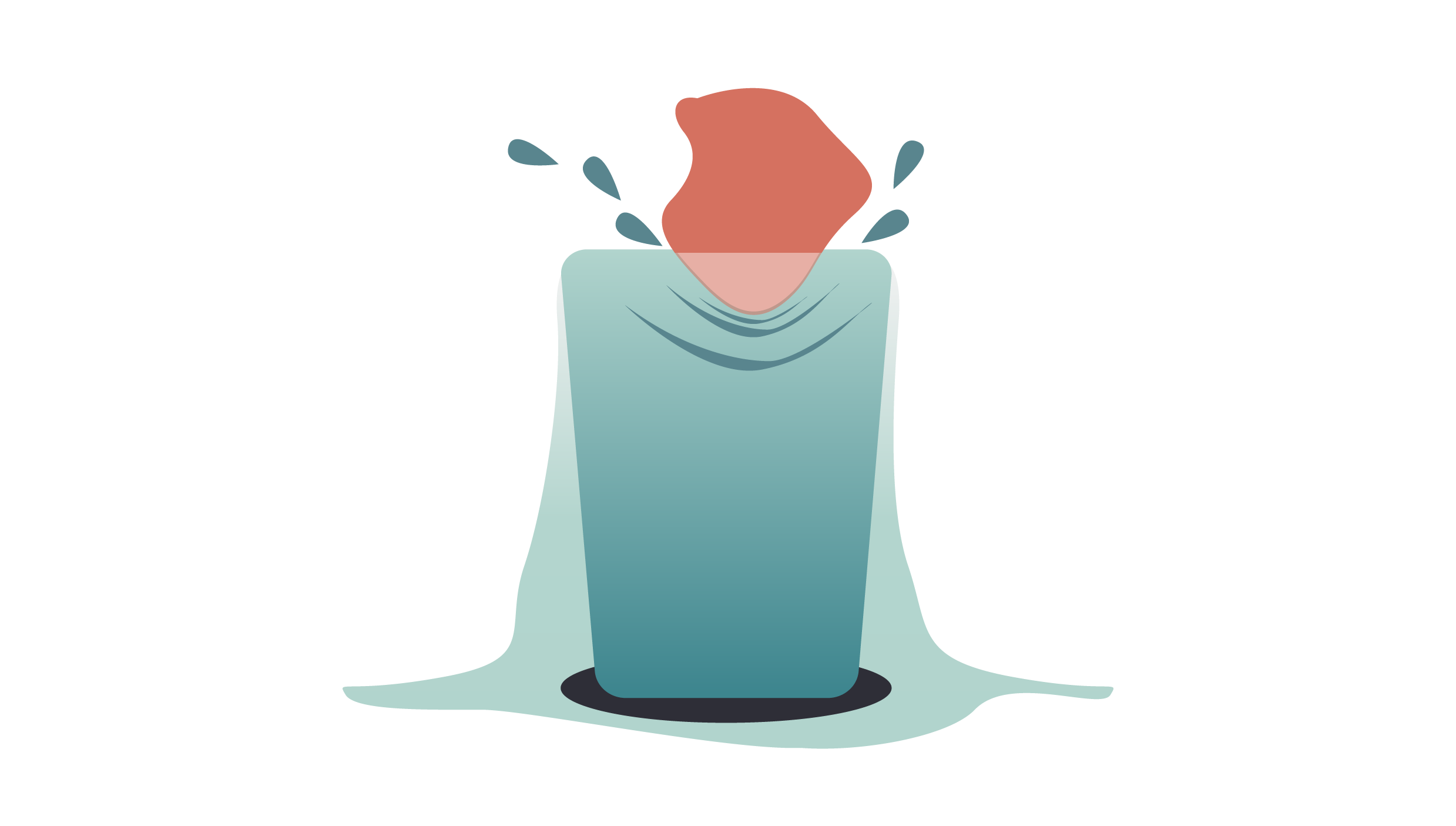
Our emotional (anger, loneliness, fear, anxiety, misery, unrest, hopelessness, despair), physical (lack of sleep or excessive sleeping, loss or increase in appetite, headaches, fatigue), behavioral, and cognitive (impatience, lack of focus, increase in conflicts in relationships) reactions throughout the COVID-19 period is our mind's way of making sense of, and coping with the reality of pandemic. Our mental "wheel alignment and balancing" has been de-calibrated, and our mind has been trying to fix this and try to find balance once more. Our waters ripple, and this is a completely normal reaction to a highly unusual incident. So, it is the situation that is abnormal, not you. If your reaction was abnormal, you would be doing one of two things.
When you throw a stone into water, what two things are against the law of nature? The water not rising or rippling, or it consistently continuing to rise and ripple without settling down - even if there are no further stimuli (stones being thrown). As the pandemic changes our lives and routines, as we experience material and nonmaterial losses, or if our lives are under threat, it is impossible for our water to remain still as if nothing has happened. If we are living as if nothing has happened, or are not reacting at all throughout this period, this is our denial mechanism kicking in. Or if our water has been violently rippling since the beginning of the pandemic as if a stone has literally just been thrown in our cup of water, we have been unable to take a break from "disaster scenarios" and form a few regular daily routines. In this case, we may be struggling more than we can cope with.

Trauma
While the pandemic is indeed a stressor for everyone, it is not traumatic for everyone. Psychological trauma happens where there is a threat to our physical or emotional wellbeing and integrity, or if our loved ones are in danger. When the impact of such situations is way beyond our ability to cope, this may leave us with traumatic stress symptoms. Natural disasters, poverty, violence, and exploitation, torture, loss and diseases, accidents, mobbing, chronic loneliness, discrimination, and wars can be referred to as traumatic events.
An important piece of information to keep in mind is that a traumatic event does not cause the same reaction in everyone - in terms of symptoms and severity. In fact, 80 to 90% of those who experience traumatic incidents psychologically recover by themselves within six months to a year. This is because just like our body, our mind is also extremely capable of healing itself.
When we encounter a traumatic incident, an internal alarm system - like the alarms in our homes - kicks in automatically; this is our survival instinct. This alarm orders you to flee, fight or freeze depending on the situation and ensures that you are physically and mentally prepared. Your heartbeat speeds up, blood drains from your hands and feet and race towards your vital organs, blocking your digestive system, and sharpening your attention and senses.
Getting ready for survival is serious business, it requires tremendous effort. Finally, when the danger goes away and you understand that you are safe, the body restores its balance, just like an alarm system that protects your house. The alarm goes off with its loud beeps when the door is forced open or a window is broken, letting you and the police know of the situation. It quiets down when the danger passes. However, there are some occasions where the alarm system breaks down and does not stop beeping; you become unable to turn it off and the beeps continue even in situations where there is no actual threat - for instance when a neighbor is passing by or when you try to open your door with your own key. On the other hand, the alarm system may also be disabled and not working when a burglar is trying to break in. If we react like these two opposing ways in the face of a traumatic incident, we may be suffering from the negative effects of traumatic stress.
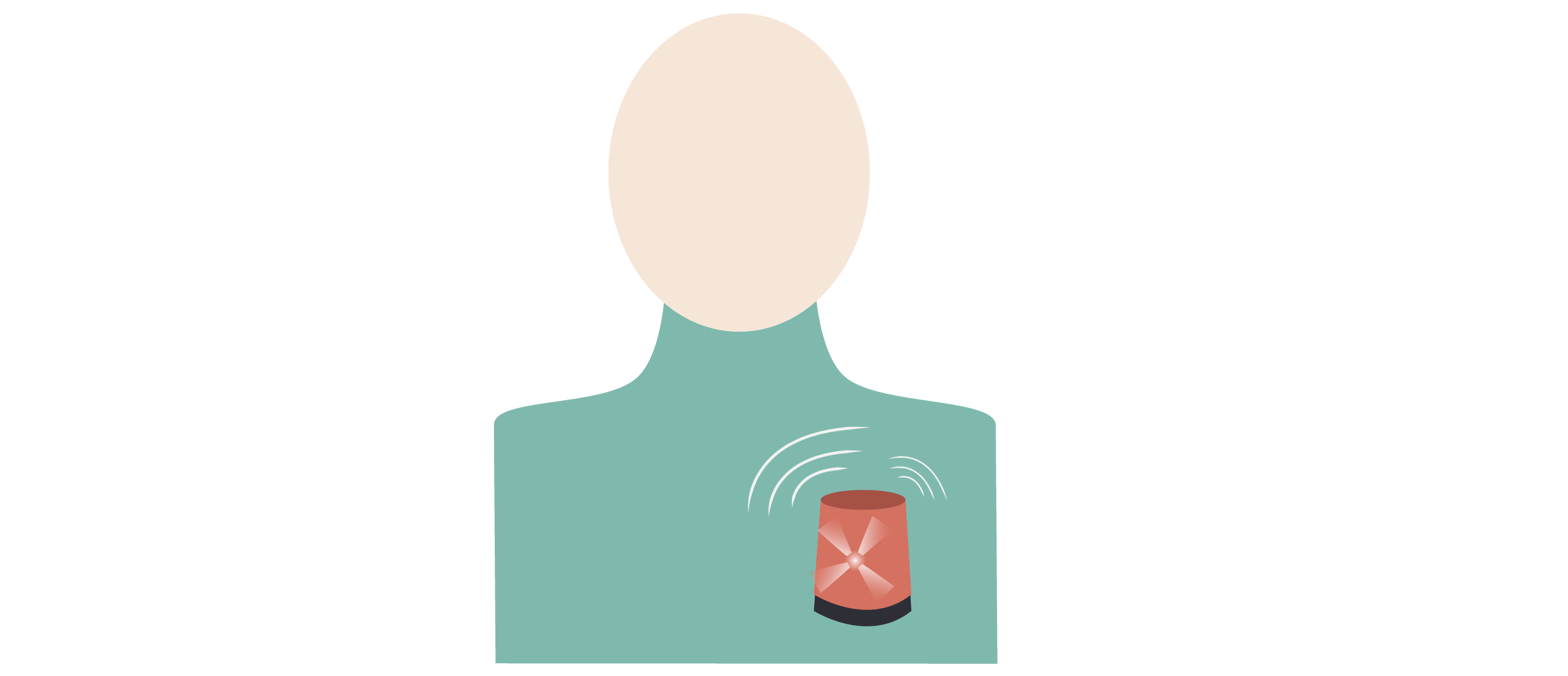
It is natural to have a more sensitive alarm whilst experiencing a long-lasting threat; just how rippling water also needs time to settle down.
It is still too early to determine whether what we are experiencing during this period has created traumatic reactions; our water is still rippling, which is extremely normal. We have not yet been able to secure ourselves and regain control of our lives. We still fear for our health and the well-being of the ones we love, are concerned about potential financial loss, mourn after those we have lost, are trying to cope with social isolation and uncertainty as well as try to adapt to our changing daily lives—all at the same time. However, it requires great physical and mental effort to constantly keep our alarm systems on. Making this effort constantly, which is supposed to be exerted only in the face of a deadly threat and for a short period of time, has the potential to cause psychological, physical, or behavioral problems.
What can we do to prevent this? The first thing to do is to check whether or not your alarm system is broken. If your reactions are still as severe as they were at the beginning of the pandemic and have started to affect your life, work, relationships, and health, it might be a good idea to get psychological support from mental health professionals. But is there anything that we can do by ourselves in order to better cope with the pandemic?

Psychological Resilience
With his theory titled "Conservation of Resources", Steven Hobfoll sheds light on the above question. Hobfoll defines (1989) stress through our resources that help us feel good, make us feel attached to life, and allow us to protect and gain our external and internal powers. He groups these resources together under four main areas: objects that meet our needs (house, car, cell phone, etc.), our personal traits (optimism, a strong sense of self), situations (interpersonal resources: romantic relationships, family, friendships and the value felt here), and the energy that eases our access to other resources (time, money, knowledge).
Hobfoll defines stressors as situations that negatively affect our inner balance, from existing financial troubles, to work, relationship problems, emotional problems from our past, or to sickness and loss. The ratio between these stressors and our resources is what defines our psychological resilience. Much like a table... Tables that have legs(resources) strong enough to carry the load we put on top (stressors) can remain stable. According to Hobfoll, the balance of the table is determined by a simple formula.

If the load of the stressors on our table is more than what the table's legs can handle, we experience an increase in our negative stress reactions. If it is the other way around, we are better able to deal with stressors. During the pandemic, a giant stressor was suddenly and uncontrollably dropped on our table, which was already in a constant struggle to try and balance itself. We are not sure about how much longer pandemic will remain on our table and keep damaging it. Then again, there is another reason we have been shaken throughout this pandemic. Hobfoll claims (1989) that a rise in negative stress reaction occurs in situations where resources are lost, are in danger of being lost, or where new resources are not gained.

Throughout this period, many coping mechanisms and resources have been taken from us, both socially and globally. Because of social isolation, we have been unable to socialize and have contact, leading to us losing one of our most important resources. We cannot even carry out our basic social rituals such as attending funerals and weddings together. A significant part of society has either lost, or is under threat of losing their financial resources due to unemployment, dismissal, and unpaid leave. Our empowering core beliefs such as "The world is a relatively safe place," " My loved ones and I do not ever suffer," "My loved ones are always healthy," "Events are mostly under my control," have all been shattered. Information, on the other hand, has become an anxiety-enhancing stressor rather than a resource that protects us. Although we want to gain new resources in this period, our capabilities are limited. So, while tons of weight has been placed on our table, some of the legs of our table have been removed at the same time. Isn't it normal to feel tired, anxious, unhappy, restless, inefficient, and shaken with a table like this?
Of course we have the right to think that the virus may infect us, or someone that we love, at any time. Because this threat is real... You are not crazy, and you are not exaggerating. You are not weak or vulnerable. You are trying to survive in the midst of a global disaster that our generation has never faced before. You don't have to spend every moment at home with maximum productivity. Your table is trying to recognize, make sense, and deal with this stressor that has been placed on it. What if you have trouble settling down? Since we cannot eliminate the pandemic, we need to strengthen the legs of our table in the first place. Engage your resources! Although we cannot do many things that we enjoyed doing before the pandemic, we can still adopt some into this process.
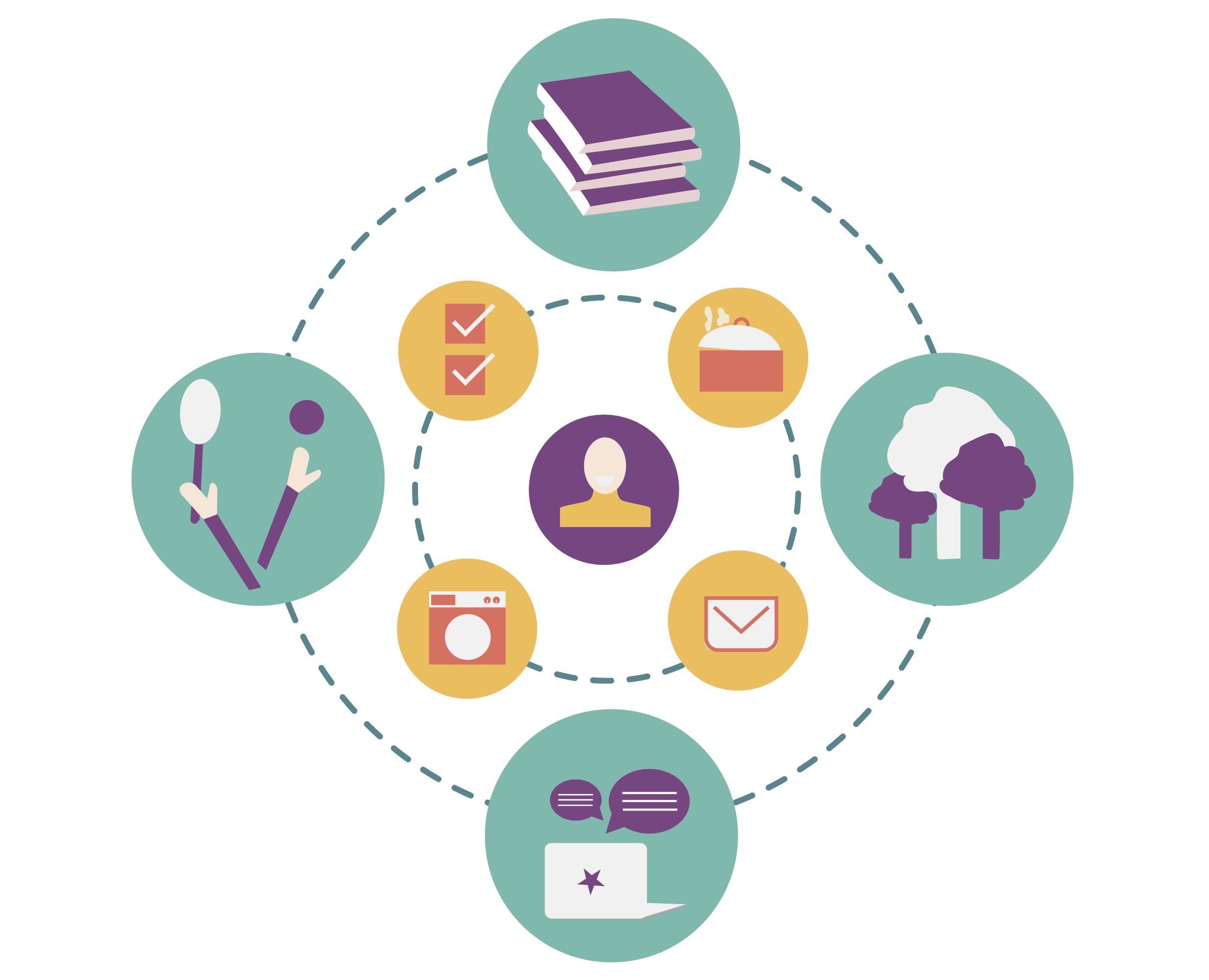
Ask yourselves "what hasn't changed?" instead of merely focusing on what has changed. Move your body as much as possible, make video calls with your friends and family, focus on activities that will simply make you happy or relaxed, set realistic and short-term goals and try to reach them; carry out your old daily routines, or establish new ones and stick to those new routines. Do as much as you can, without straining yourself and trying to be too perfect. Honestly, do not feel bad if you aren't baking all sorts of new types of bread.

Solidarity
One of the things we continued to do throughout 2020 was to also adapt our community events online in order to maintain that sense of togetherness and belonging. We held several "pot luck lunches," organized "play & live" days where members of the community could present events ranging from cookery classes to yoga and improv. We were determined to also continue to learn together, so we invested time and resources into an online learning experiment with ATÖLYE Academy's 450-person Learning Community, and interacted with a diverse group of individuals through Slack (in the first few months of the pandemic, our Slack space had 12 times more engagement than before!) and online training sessions.
We organized several local and global hackathons working together with groups we may have not had a chance with if everything was as before. We took part in a virtual exhibition game organized by one of our Community members and found even more new ways to explore and adapt to the present situation through ever-growing collaborative tools such as Graph Commons, Milanote, Miro, Mural, etc. It looks like we will continue to do this at ATÖLYE in 2021; but what about the rest of society? To maintain a level of optimism and hope, we must continue to work with one another collectively to ensure we get through this difficult time.
We know that a sense of solidarity and being together is good for everyone during such disasters. Studies show that providing support, as well as getting it, helps us recover from trauma. Remember that being able to support those in need and requesting support when you need it, are indeed the keys to getting through these days with minimal damage!

Are we on the same boat as a global society?

When the coronavirus first hit and spread across the world, at first there was a mixed sense of confusion, denial, and shock. Some people denied the coronavirus and called it a "hoax." All the while the WHO, governments, health workers, and ordinary citizens tried to wrap their heads around the new harsh reality of this deadly disease. Even a year on, conspiracy theories prevail and misinformation regarding the virus continues to spread across social media all amidst growing extremism, economic crisis, and societal conflict.
2020 was not just the year of the coronavirus. It was a year full of "political chaos, freak weather and wildfires, earthquakes, and protests everywhere." Reuters scrapbook "Clippings from the longest year" reflects this well. So, the question is, how do we get through ALL of this together?
How do we indeed learn to come together as a global society for the future?
In order for every member of a society to survive during a global disaster, common resources need to be distributed equally and fairly. Before the pandemic, a significant part of the world's population was already struggling to keep their table steady. The number and robustness of our table legs were not equal. Some of us were not able to access basic human rights and needs, such as job security, shelter, nourishment, healthcare, and education. There are many robust table legs in humanity's storehouse, but were they, and are they, available to every member of the society? When we take a look at the dominant political, economic and social system through the outermost circle in Bronfenbrenner's ecological model, we see the exact opposite. We were not equal before the pandemic, so we are not currently in the same boat. We have had different experiences of the pandemic and this will continue to be the case. The coronavirus has just helped us recognize this inequality more.
This is exactly why we cannot find a common formula for survival during the pandemic. Staying at home during the pandemic as a laborer, who works in precarious conditions and lives below the breadline, would mean starvation for his family. What rules of hygiene or social distancing protocols would be enough for communities all over the world. What about those who have been forced to live in refugee camps or container cities following earthquakes, or those who do not have access to clean water, to protect themselves from the Covid-19? The violence, oppression, and abuse against women, children, and minorities go on; even in their own houses and neighborhoods. The conditions that keep us safe at our homes or in life overall are not the same. So how can a common motto solve everyone's problems?
Staying at home can protect against COVID-19, but can it guarantee our survival? How realistic is it to ignore the deep gap between the resources we use in moments of crisis, and expect everyone to adapt and take the same measures during this period? While class differences and social injustice are so deeply entrenched, applying a single formula is unrealistic. It is also a clear indication of whom governments will sacrifice in moments of crisis. As George Orwell said: all animals are equal, but some animals are more equal than others.

The COVID-19 pandemic has allowed us to see the constantly neglected segment of society and to share common emotions, even though we were never at the same level before. Maybe some of us remembered those people who were imprisoned for their thoughts while we weren't able to see our loved ones and touch them.
We have also seen that throughout the COVID-19 pandemic, collective initiatives and reactions have grown significantly. The reason is quite simple: we are learning the hard way that, in order to fight a direct threat, we must learn to live and survive together. We now see how those people, who we maybe never thought about or spoke out for before, are vital for us to access our basic needs and get along with our daily lives.
We have been uniting, as a society, to support the members of our communities who are at risk of survival. Is this surprising? Certainly not. We have gone through a collective intimacy and solidarity process which is one of the primary reactions communities may experience after a collective trauma. Yes, this may have been felt more during the "honeymoon period" where after the initial shock of a disaster, there is a desire to work together to "survive" and even "thrive". We may have felt empowered even and the feeling of change. Yet, the truth is, we have and will continue to feel highs and lows throughout this period. And we will continue to realize that only through communicating and reaching out to one another, can we collectively ease our pain.
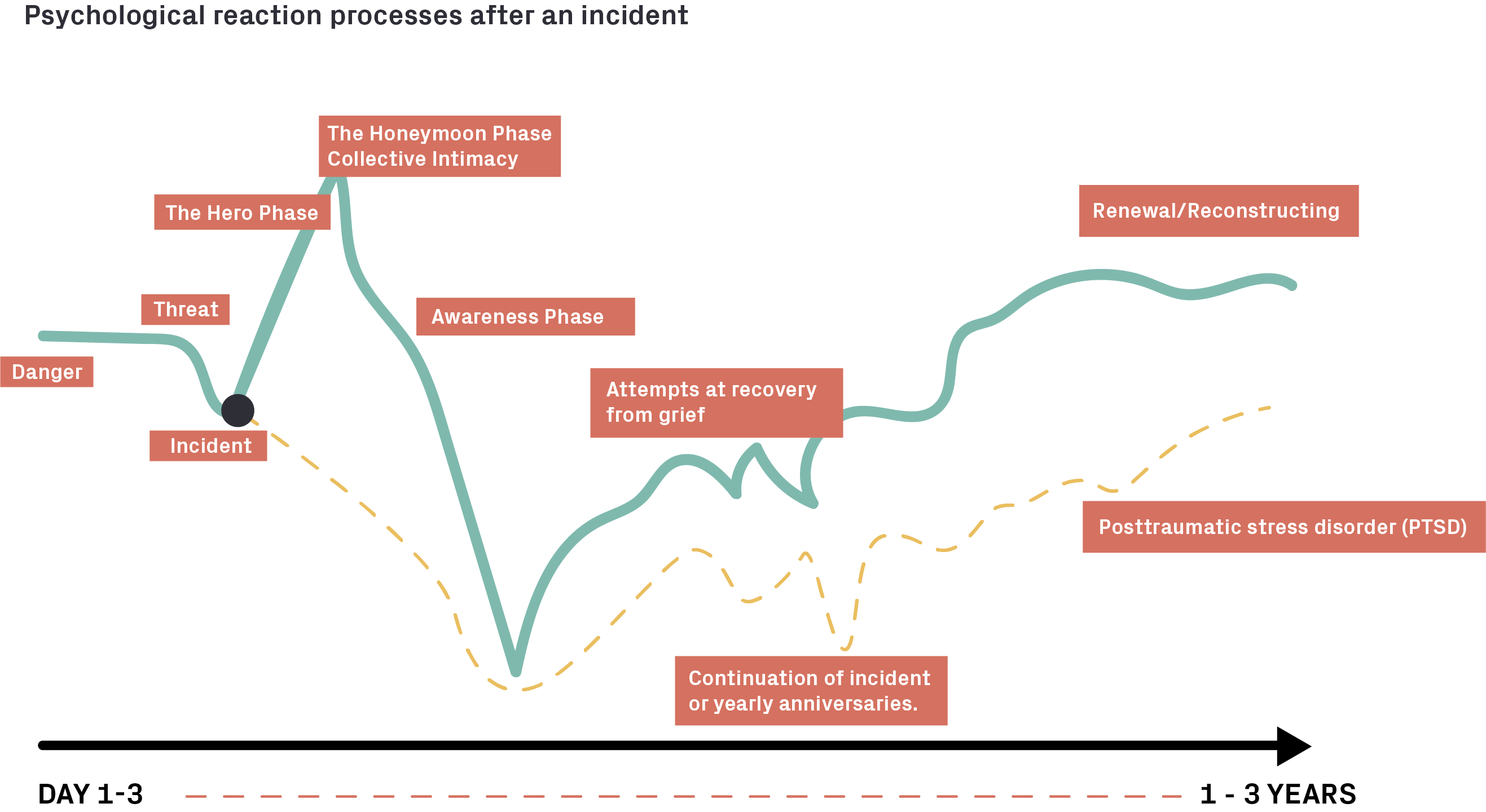
Perhaps we are becoming aware of the needs of our essence, which has been separated from nature by urbanization in the days of quarantine when we cannot look at the sky. Hopefully, we are realizing the necessity to restructure our moral and ethical values if we want to further our being.
We are observing that we only get through these days through solidarity, tolerance, sharing, empathy and collective intimacy.
The COVID-19 period has truly lifted the veil and allowed us to see the existence of dysfunctional and unjust economic, political, and social systems as well as their impact on individual and community levels. The pandemic has laid down the necessity of global-level change as a condition for our survival. After experiencing such painful mass traumas, it is impossible for individuals and societies to resume pre-pandemic circumstances. While it is possible to blossom out of traumatic experiences, we need to step forward rather than going back to old established systems, for that to happen.
After the pandemic ends, it is possible that we may gradually lose the sense of solidarity and collective action as we see in many post mass trauma contexts. Maybe we will continue preserving our resources for our own benefit like we had been doing. Or maybe, and hopefully, we will embrace this acquired sense of togetherness, and share our resources with the members of the community and start raising our voices against the injustices taking place against others.
We can construct systems that prioritize our common needs while enabling collective consciousness to survive and flourish.
This requires global solidarity, shared wisdom, an action plan as well as organized struggle. We are the people who will create this wisdom. Enlightenment is always preceded by moments of chaos. Keep hope alive, and take action!

11 Key Takeaways
- Your reaction to this abnormal global disaster is completely normal.
- Traumatic incidents do not always lead to trauma.
- People may react to the same traumatic event with different intensity and duration.
- Traumas make you feel disconnected and isolated; try to reconnect with your loved ones, nature, and your goals.
- The more resources we have compared to the amount of stressors, the better we will cope. Strengthen your resources.
- Stay true to your routines. Don't overwhelm yourself with too many new ones.
- Ask yourself "what hasn't changed?" Remember that there is still some stability in your life.
- When the honeymoon period is over, solidarity is key to feel supported and to help you heal.
- Try to connect with other communities online.
- Remember, these days will pass.
- If you are having trouble coping, remember to ask for support from mental health professionals.
Free psychological support for those impacted by COVID-19:
Turkey: KORDEP (Coronavirus Online Mental Support Program) 0 850 305 0034
Please contact relevant institutions in your country to see if you can access free psychological support. If you know of any that may be helpful please drop in the comments below. For more information or to ask more questions, you can always contact Dr. Çiğdem Yumbul at cigdem.yumbul@gmail.com
Sources:
- Bronfenbrenner, U. (1979). The ecology of human development. Harvard university press.
2. Herman, J. (2007). Travma ve iyileşme. İstanbul: Literatür Yayıncılık.
3. Levine, P. A., & Frederick, A. (1997). Kaplanı uyandırmak. Butik.
4. Pauline, B., & Boss, P. (2009). Ambiguous loss: Learning to live with unresolved grief. Harvard University Press.
5. Saul, J. (2013). Collective trauma, collective healing: Promoting community resilience in the aftermath of disaster (Vol. 48). Routledge.
6. Van Der Kolk, B. A. (2018). Beden Kayıt Tutar: Travmanın İyileşmesinde Beyin, Zihin ve Beden. Ankara: Nobel yaşam yayıncılık.
7. Hobfoll, S. E. (1989). Conservation of resources: A new attempt at conceptualizing stress. American Psychologist, 44(3), 513. doi:10.1037/0003–066x.44.3.513
8. WHO, 5 October 2020, <https://www.who.int/news/item/05-10-2020-covid-19-disrupting-mental-health-services-in-most-countries-who-survey>
